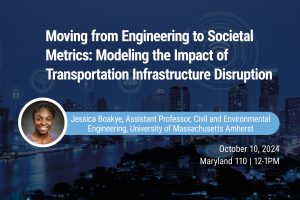
Jessica Boakye, Assistant Professor in the department of Civil and Environmental Engineering at the University of Massachusetts Amherst will give a talk titled “Moving from Engineering to Societal Metrics: Modeling the Impact of Transportation Infrastructure Disruption.”
Abstract
Traditional engineering metrics focus on the performance of infrastructure while neglecting the societal implications of failure, disruption, or deterioration. This disconnect impedes mitigation. Successful mitigation relies on an accurate prediction or model of the relevant impact. To overcome this gap, this talk introduces methods for modeling and assessing the societal impacts of transportation infrastructure failure. Two different scenarios are considered: hazard and non-hazard. Network simulation, risk analysis, and digital twinning methods are used to model the transportation infrastructure and surrounding community. The hazard scenario examines small scale infrastructure failure (i.e., culverts) during flooding events. The impact on hospital connectivity in a rural community is examined. The non-hazard scenario examines pavement condition and its effect on work travel. Both case studies are developed using real Massachusetts communities and infrastructure to demonstrate applicability. Methods are presented which allow for the identification of vulnerable populations, an assessment of the disproportionate impact, and mitigation suggestions.
Bio
Jessica Boakye is an Assistant Professor of Civil and Environmental Engineering at the University of Massachusetts Amherst. She received her BS in Civil and Environmental Engineering from the University of Massachusetts Amherst in 2014. She then received her MS in Structural Engineering from the University of Illinois Urbana-Champaign in 2016 and PhD in Societal Risk and Hazard Mitigation from the University of Illinois at Urbana-Champaign in 2020. Her research group focuses on quantifying, predicting, and mitigating the societal consequences of infrastructure failure or disruption. She has an interest in creating metrics which are centered on community goals such as equity, resilience, and sustainability.